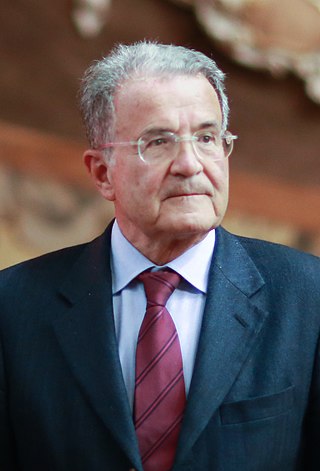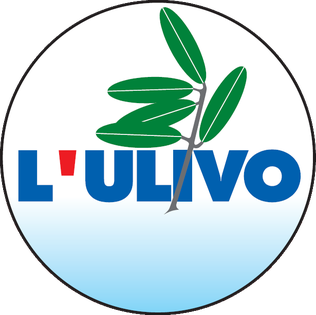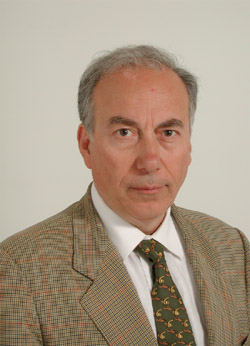In politics, a red–green alliance or red–green coalition is an alliance of "red" parties with "green" parties. The alliance is often based on common left political views, especially a shared distrust of corporate or capitalist institutions. While the "red" social-democratic parties tend to focus on the effects of capitalism on the working class, the "green" environmentalist parties tend to focus on the environmental effects of capitalism.

Romano Prodi is an Italian politician, economist, academic, senior civil servant, and business executive who served as the tenth president of the European Commission from 1999 to 2004. He served twice as Prime Minister of Italy, first from 18 May 1996 to 21 October 1998, and then from 17 May 2006 to 8 May 2008. Prodi is considered the founder of the Italian centre-left and one of the most prominent and iconic figures of the so-called Second Republic. He is often nicknamed Il Professore due to his academic career.

The Democrats of the Left was a social-democratic political party in Italy. Positioned on the centre-left, the DS, successor of the Democratic Party of the Left (PDS) and the Italian Communist Party, was formed in 1998 upon the merger of the PDS with several minor parties. A member of The Olive Tree coalition, the DS was successively led by Massimo D'Alema, Walter Veltroni, and Piero Fassino, and merged with Democracy is Freedom – The Daisy and a number of minor centre-left parties to form the Democratic Party in October 2007.

The Olive Tree was a denomination used for several successive centre-left political and electoral alliances of Italian political parties from 1995 to 2007.

The Party of Italian Communists was a communist party in Italy established in October 1998 by splinters from the Communist Refoundation Party (PRC). The split was led by Armando Cossutta, founder and early leader of the PRC, who opposed Fausto Bertinotti's leaderhip and, especially, his decision to withdraw support from Romano Prodi's first cabinet. In December 2014, the party was transformed into the Communist Party of Italy (PCd'I), which would later evolve into the new version of the Italian Communist Party (PCI).

The Democratic Party of the Left was a democratic-socialist and social-democratic political party in Italy. Founded in February 1991 as the post-communist evolution of the Italian Communist Party, the party was the largest in the Alliance of Progressives and The Olive Tree coalitions. In February 1998, the party merged with minor parties to form Democrats of the Left. At its peak in 1991, the party had a membership of 989,708; by 1998, it was reduced to 613,412.

The 1996 Italian general election was held on 21 April 1996 to elect members of the Chamber of Deputies and the Senate of the Republic. Romano Prodi, leader of the centre-left The Olive Tree, won the election, narrowly defeating Silvio Berlusconi, who led the centre-right Pole for Freedoms.

The Movement of Unitarian Communists, or simply Unitarian Communists, was a communist political party in Italy.

The 1992 Italian general election was held on 5 and 6 April 1992. They were the first without the traditionally second most important political force in Italian politics, the Italian Communist Party (PCI), which had been disbanded in 1991. Most of its members split between the more democratic-socialist oriented Democratic Party of the Left (PDS), while a minority who did not want to renounce the communist tradition became the Communist Refoundation Party (PRC); however, between them they gained around 4% less than what the already declining PCI had obtained in the 1987 Italian general election, despite PRC absorbing the disbanded Proletarian Democracy (DP).

The Workers' Communist Party is a communist party in Italy. It was created in 2006 by the Trotskyist breakaway wing of the Communist Refoundation Party led by Marco Ferrando. The PCL is the Italian section of Coordinating Committee for the Refoundation of the Fourth International.

The second Prodi government was the cabinet of the government of Italy from 17 May 2006 to 8 May 2008, a total of 722 days, or 1 year, 11 months and 21 days. The 59th cabinet of the Italian Republic, it was the only cabinet of the XV Legislature.

The Alliance of Progressives was a left-wing political alliance of parties in Italy formed in 1994, with relevant predecessors at local level in 1993. The leader of the alliance was Achille Occhetto. The alliance was a predecessor of the modern-day centre-left coalition.

The third Berlusconi government was the cabinet of the government of Italy from 23 April 2005 to 17 May 2006. It was the 58th cabinet of the Italian Republic, and the second cabinet of the XIV Legislature.

Massimo D'Alema is an Italian politician and journalist who was the 53rd prime minister of Italy from 1998 to 2000. He was Deputy Prime Minister of Italy and Minister of Foreign Affairs from 2006 to 2008. D'Alema also served for a time as national secretary of the Democratic Party of the Left (PDS). The media has referred to him as Leader Maximo due to his first name and for his dominant position in the left-wing coalitions during the Second Republic.

The Ciampi Cabinet, led by the former Governor of the Bank of Italy Carlo Azeglio Ciampi, was the 50th cabinet of the Italian Republic and the second and final cabinet of the XI Legislature. It held office from 29 April 1993 until 11 May 1994, a total of 378 days, or 1 year and 12 days.

The first D'Alema government was the government of Italy from 21 October 1998 to 22 December 1999.

The Communist Refoundation Party is a communist political party in Italy that emerged from a split of the Italian Communist Party (PCI) in 1991. The party's secretary is Maurizio Acerbo, who replaced Paolo Ferrero in 2017. Armando Cossutta was the party's founder, while Fausto Bertinotti its longest-serving leader (1994–2008). The latter transformed the PRC from a traditional communist party into a collection of radical social movements.
The centre-left coalition is an alliance of political parties in Italy active, under several forms and names, since 1995 when The Olive Tree was formed under the leadership of Romano Prodi. The centre-left coalition has ruled the country for more than 15 years between 1996 and 2022.

Municipal elections were held in Milan on 27 April and 11 May 1997 to elect the Mayor of Milan and the 60 members of the City Council.

Famiano Crucianelli is an Italian politician and surgeon.









































